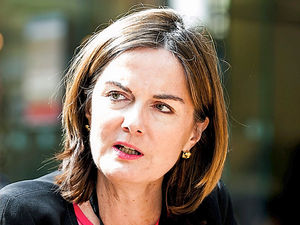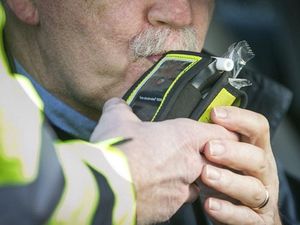Mubarek Ali: Why is he just being let out?
An MP has demanded to know why a ringleader of a Shropshire sex grooming gang is being allowed to be released automatically.

Lucy Allan has written to Justice Secretary David Liddington, to ask why a law to prevent certain criminals being freed on reaching the halfway point on their sentence was not applied to Mubarek Ali.
She has now called for him to consider an amendment to the law to ensure it applies to perpetrators of child sexual exploitation serving custodial sentences at the time the act came into effect.

Measures in the Criminal Justice and Courts Act were introduced by then justice secretary Chris Grayling MP in April 2015 to prevent serious criminals, including child rapists, from being automatically released at the halfway point of their custodial sentence – and then only under strict conditions at the discretion of a parole board.
Ali’s release was triggered automatically and at no time was the parole board involved in the decision to allow him to be freed in November.
In her letter to Mr Liddington, Ms Allan says: “Sentencing in the Telford case took place in 2012, before the implementation of the act.
“Accordingly, the perpetrator, despite being given a 14 year custodial sentence with a further eight years in licence, is now eligible for release, there has been no parole board in this case.
“I am extremely concerned about the implications of an early release in this case. I know the Government takes child sexual exploitation (CSE) extremely seriously and is committed to ending early release for child rapists.
“However, two years after the then justice secretary, Chris Grayling MP, said child rapists would not be released early and only then at the discretion of a parole board, we see a serial CSE offender being released only five years after sentencing without the case being considered by a parole board.”
Ms Allan has said the lack of a parole board, and lack of contact with victims of Ali, who still live in Telford, are now “living in fear” in the knowledge that he could be back in the borough following his release in November. She is calling for the amendment to be considered to prevent similar situations from occurring again.
She said: “CSE should fall into this category of offence. Yet it appears from the release date that this has not happened in this case.
“Underage girls were being sold for sex. That is clearly child rape. It would be horrifying if this case has not been treated as child rape. We must never allow CSE to be treated as if it were prostitution, it is child rape. These girls were victims of a horrendous crime. They did not consent.”
Previously Ms Allan has raised concerns that the victim contact scheme was not brought into effect surrounding the release.
The Department of Justice says the statutory National Probation Service’s Victim Contact Service should be offered to victims of specified violent and sexual offences where the offender receives a sentence of 12 months or more.
The service gives people affected by crime information at key stages in a criminal’s sentence. It tells victims if an offender is being transferred or released. It also enables victims to make representations to a parole board if an offender is being considered for release.
But in the case of Mubarek Ali, no parole hearing was held and therefore his victims were never consulted or informed of the process to free him.
Ms Allan said it was “unacceptable” that there appears to have been no attempt to contact the young women affected.
She said: “The Victim Contact Scheme was supposed to be in place in this kind of horrific crime, precisely because victims must have a voice. They should be entitled to feed into the process by giving their thoughts and concerns and those concerns should be acted upon.
“I want to know why in a crime of this nature, a criminal is being released halfway through a sentence when measures in the Criminal Justice and Courts Act were introduced to prevent serious criminals from being released before the end of their prison term and only under strict conditions at the discretion of the independent parole board.
“Offenders have to show they no longer pose a threat to the public. In this case it appears there was not even a parole board. This was because the perpetrator was eligible for release half way though the custodial sentence.
“This should not be the case in CSE crimes. We need to know the public will not be put at risk in future.
“CSE is not just any crime. It has a lifelong impact on victims and their families. It is a crime which affects whole communities. CSE is about control manipulation and fear. These young women could have been any of our daughters. They deserve to know that they are being heard and their views respected.”
One of Ali’s victims has also written to the parole board to express her dismay that she was not contacted. The email claims that she found out about Ali’s forthcoming release through one of the other victims.
She has now written a statement which she wants to be presented ahead of the release in November and has asked to be part of the process of writing the licence agreements around his release.
The letter, which was sent on her behalf by an advocate, said: “This young lady just wants to be able to sleep a good night’s sleep in her own bed without fear, for her and her family.
“This young lady really didn’t want to go through this again.”
50,000 sign petition demanding release from prison be reviewed
More than 50,000 people have now signed a petition demanding a review of the decision to release Mubarek Ali.
The petition was created on change.org when the Shropshire Star revealed he was set to be released in November.
It demands the decision be reversed and also criticises the fact no victims were made aware of the situation because the parole board never became involved..
More than 3,000 people also voted in a Shropshire Star poll in which 77 per cent of those taking part said the decision was wrong.
And scores of readers have commented on the issue on the Star’s Facebook page.
Lynette Vaughan said: “If he is let out earlier then he shouldn’t be allowed back in Telford. No-one is thinking about those poor girls.”
Chantal Yale questioned how Ali could be monitored once he is released to ensure he does not offend again, adding: “The police service is so understaffed. He is a risk and will always be a risk.”
Claire Roberts agreed, adding: “How can this be manned? No police force will be able to watch him 24/7 and I guarantee he won’t be a changed person. He may be able to say the right things whilst inside to get parole but I’m sure he will be the same man.”
Samantha Urquhart said the decision to release Ali early sent all the wrong messages to society, adding: “It is teaching people that they can do despicable things and the odds are they get away with it.”
West Mercia Police and Crime Commissioner John Campion this week said he was concerned about the message Ali’s release was giving, saying victims of child sexual exploitation must be able to put their trust in the justice system.
He said: “We cannot ask victims to have the courage to speak out and seek help if they just end up feeling the criminal justice system has let them down.
“I am working hard to improve the parts of that system that I can – such as local policing and victim services. However, there is a bigger challenge around how the wider system works beyond our control.
“Collectively and individually we cannot fail those victims who put their trust in our criminal justice system, often in the most traumatic of circumstances.”





